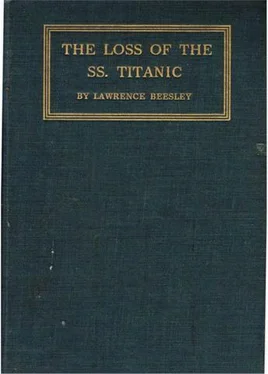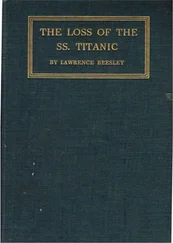As we steamed down the river, the scene we had just witnessed was the topic of every conversation: the comparison with the Olympic-Hawke collision was drawn in every little group of passengers, and it seemed to be generally agreed that this would confirm the suction theory which was so successfully advanced by the cruiser Hawke in the law courts, but which many people scoffed at when the British Admiralty first suggested it as the explanation of the cruiser ramming the Olympic. And since this is an attempt to chronicle facts as they happened on board the Titanic, it must be recorded that there were among the passengers and such of the crew as were heard to speak on the matter, the direst misgivings at the incident we had just witnessed. Sailors are proverbially superstitious; far too many people are prone to follow their lead, or, indeed, the lead of any one who asserts a statement with an air of conviction and the opportunity of constant repetition; the sense of mystery that shrouds a prophetic utterance, particularly if it be an ominous one (for so constituted apparently is the human mind that it will receive the impress of an evil prophecy far more readily than it will that of a beneficent one, possibly through subservient fear to the thing it dreads, possibly through the degraded, morbid attraction which the sense of evil has for the innate evil in the human mind), leads many people to pay a certain respect to superstitious theories. Not that they wholly believe in them or would wish their dearest friends to know they ever gave them a second thought; but the feeling that other people do so and the half conviction that there “may be something in it, after all,” sways them into tacit obedience to the most absurd and childish theories. I wish in a later chapter to discuss the subject of superstition in its reference to our life on board the Titanic, but will anticipate events here a little by relating a second so-called “bad omen” which was hatched at Queenstown. As one of the tenders containing passengers and mails neared the Titanic, some of those on board gazed up at the liner towering above them, and saw a stoker’s head, black from his work in the stokehold below, peering out at them from the top of one of the enormous funnels—a dummy one for ventilation—that rose many feet above the highest deck. He had climbed up inside for a joke, but to some of those who saw him there the sight was seed for the growth of an “omen,” which bore fruit in an unknown dread of dangers to come. An American lady—may she forgive me if she reads these lines!—has related to me with the deepest conviction and earnestness of manner that she saw the man and attributes the sinking of the Titanic largely to that. Arrant foolishness, you may say! Yes, indeed, but not to those who believe in it; and it is well not to have such prophetic thoughts of danger passed round among passengers and crew: it would seem to have an unhealthy influence.
We dropped down Spithead, past the shores of the Isle of Wight looking superbly beautiful in new spring foliage, exchanged salutes with a White Star tug lying-to in wait for one of their liners inward bound, and saw in the distance several warships with attendant black destroyers guarding the entrance from the sea. In the calmest weather we made Cherbourg just as it grew dusk and left again about 8.30, after taking on board passengers and mails. We reached Queenstown about 12 noon on Thursday, after a most enjoyable passage across the Channel, although the wind was almost too cold to allow of sitting out on deck on Thursday morning.
The coast of Ireland looked very beautiful as we approached Queenstown Harbour, the brilliant morning sun showing up the green hillsides and picking out groups of dwellings dotted here and there above the rugged grey cliffs that fringed the coast. We took on board our pilot, ran slowly towards the harbour with the sounding-line dropping all the time, and came to a stop well out to sea, with our screws churning up the bottom and turning the sea all brown with sand from below. It had seemed to me that the ship stopped rather suddenly, and in my ignorance of the depth of the harbour entrance, that perhaps the sounding-line had revealed a smaller depth than was thought safe for the great size of the Titanic: this seemed to be confirmed by the sight of sand churned up from the bottom—but this is mere supposition. Passengers and mails were put on board from two tenders, and nothing could have given us a better idea of the enormous length and bulk of the Titanic than to stand as far astern as possible and look over the side from the top deck, forwards and downwards to where the tenders rolled at her bows, the merest cockleshells beside the majestic vessel that rose deck after deck above them. Truly she was a magnificent boat! There was something so graceful in her movement as she rode up and down on the slight swell in the harbour, a slow, stately dip and recover, only noticeable by watching her bows in comparison with some landmark on the coast in the near distance; the two little tenders tossing up and down like corks beside her illustrated vividly the advance made in comfort of motion from the time of the small steamer.
Presently the work of transfer was ended, the tenders cast off, and at 1.30 P.M., with the screws churning up the sea bottom again, the Titanic turned slowly through a quarter-circle until her nose pointed down along the Irish coast, and then steamed rapidly away from Queenstown, the little house on the left of the town gleaming white on the hillside for many miles astern. In our wake soared and screamed hundreds of gulls, which had quarrelled and fought over the remnants of lunch pouring out of the waste pipes as we lay-to in the harbour entrance; and now they followed us in the expectation of further spoil. I watched them for a long time and was astonished at the ease with which they soared and kept up with the ship with hardly a motion of their wings: picking out a particular gull, I would keep him under observation for minutes at a time and see no motion of his wings downwards or upwards to aid his flight. He would tilt all of a piece to one side or another as the gusts of wind caught him: rigidly unbendable, as an aeroplane tilts sideways in a puff of wind. And yet with graceful ease he kept pace with the Titanic forging through the water at twenty knots: as the wind met him he would rise upwards and obliquely forwards, and come down slantingly again, his wings curved in a beautiful arch and his tail feathers outspread as a fan. It was plain that he was possessed of a secret we are only just beginning to learn—that of utilizing air-currents as escalators up and down which he can glide at will with the expenditure of the minimum amount of energy, or of using them as a ship does when it sails within one or two points of a head wind. Aviators, of course, are imitating the gull, and soon perhaps we may see an aeroplane or a glider dipping gracefully up and down in the face of an opposing wind and all the time forging ahead across the Atlantic Ocean. The gulls were still behind us when night fell, and still they screamed and dipped down into the broad wake of foam which we left behind; but in the morning they were gone: perhaps they had seen in the night a steamer bound for their Queenstown home and had escorted her back.
All afternoon we steamed along the coast of Ireland, with grey cliffs guarding the shores, and hills rising behind gaunt and barren; as dusk fell, the coast rounded away from us to the northwest, and the last we saw of Europe was the Irish mountains dim and faint in the dropping darkness. With the thought that we had seen the last of land until we set foot on the shores of America, I retired to the library to write letters, little knowing that many things would happen to us all—many experiences, sudden, vivid and impressive to be encountered, many perils to be faced, many good and true people for whom we should have to mourn—before we saw land again.
Читать дальше












